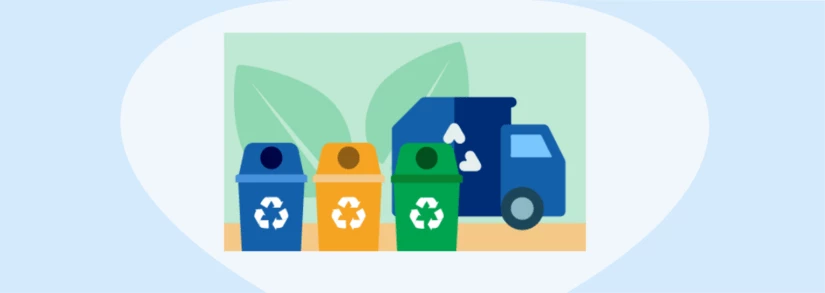The capacity for plastic recycling in Ireland has evolved significantly, expanding beyond basic bottles and packaging to include most soft plastics and films. If you need clarity on the current national rules for plastic segregation or seek information on minimizing your plastic consumption, this guide provides the latest updates, including the impact of the Deposit Return Scheme.
The Critical Importance of Plastic Recycling
Recent data indicates that plastic waste generation in Ireland remains excessively high, with the Environmental Protection Agency (EPA) reporting a significant volume of waste generated per capita.
Ireland is currently predicted to miss its EU recycling targets for 2025, particularly the 50% target for plastic packaging recycling (the current rate is approximately 30-32%). This reality underscores the necessity of improved management, primarily for these reasons:
- Ecosystem Contamination: Plastic, especially microplastics, enters the environment, posing a threat to animal health and potentially contaminating our food supply chains.
- Resource Depletion & Targets: The majority of plastic materials are derived from non-renewable sources. Missing the mandatory 2025 targets means Ireland is failing to conserve these resources and faces penalties under the EU's Circular Economy goals.
- Toxicity: As plastics degrade (which can take between 20 and 500 years), they release toxic components into the soil and water.
- Financial Penalties: Improper use of recycling bins, such as placing contaminated materials, can result in **fixed fines** for households under current incentivized charging schemes.
Current Rules for Plastic Recycling in Ireland
The range of plastic recycling Ireland can handle has vastly improved due to technological advancements in MRFs (Material Recovery Facilities). These facilities are now highly proficient at automatically sorting and processing a much wider variety of materials, leading to the All-Plastics-in-the-Bin rule.
The major change is the acceptance of soft plastics (plastic films, wrappers, and bags) in the household dry recycling bin alongside rigid plastics.
This means that nearly all everyday plastic packaging can now be placed in your recycling bin. The primary exceptions remain certain large, durable, or non-packaging plastics.
Check the examples below to confirm what plastic recycling Ireland accepts in household bins:
- Plastic bottles, caps, and lids (including cleaning product bottles)
- Yoghurt pots, butter tubs, and all rigid food tubs
- Shampoo, shower gel, and detergent bottles
- Rigid plastic food packaging (e.g., fruit trays)
- Soft plastics (e.g., crisp packets, flexible food wrappers, plastic film, plastic bags, bubble wrap)
- Contaminated plastics (any plastic with food residue or dirt that cannot be cleaned)
- Hard plastics, PVC, and large Polystyrene (e.g., toys, garden furniture, construction pipes, large foam packaging – these require specialist disposal at a Civic Amenity Centre, not household bins)
Contamination Warning: All recycling bin contents must be clean, dry, and loose. Soiled or wet plastics are considered contaminants and cannot be processed, resulting in their redirection to landfill, which reduces the efficiency of the entire batch.
New Legislation & Initiatives in 2025
Ireland has implemented several key initiatives driven by EU directives to radically alter how plastic waste is managed:
- Deposit Return Scheme (DRS): Launched in 2024, the Re-turn scheme applies a small refundable deposit to PET plastic bottles and aluminium/steel cans (150ml to 3L). By early 2025, the scheme reported over 980 million containers returned and an 84% participation rate, dramatically increasing the quality of plastic recycling for these specific items.
- Single-Use Plastics (SUP) Bans & Design: Ireland banned several SUP items (cutlery, plates, straws, expanded polystyrene containers) in 2021. From July 2024, caps on plastic beverage containers up to 3L must be tethered (attached to the bottle). By February 2025, PET beverage bottles must contain a minimum of 25% recycled plastic.
- Mandatory Brown Bins: As of early 2024, all waste collectors are obliged to provide all household customers with a Brown Bin for food and garden waste. This aims to divert organic material (which often contaminates plastic bins) from landfill, supporting the national target to halve food waste by 2030.
Identifying Recyclable Plastic Types
The Mobius Loop is the international symbol indicating that a material is capable of being recycled. On plastic, it usually appears with the Resin Identification Code (RIC), a number from 1 to 7.
This number helps processors sort the material.
Here is a shortlist of common plastic types and their recyclability status in Irish household bins:
- PET (1) - Polyethylene Terephthalate: Highly recyclable. Used in beverage bottles, food containers. (Subject to DRS)
- HDPE (2) - High-Density Polyethylene: Highly recyclable. Used in milk bottles, detergent containers, and non-food applications.
- LDPE (4) - Low-Density Polyethylene: Recyclable (accepted as soft plastic). Used in plastic bags, bin liners, and packaging film.
- PP (5) - Polypropylene: Recyclable. Used in food tubs (e.g., yoghurt pots) and some packaging.
- PS (6) - Polystyrene: Not accepted in household bins. Used in foam packaging and disposable cups. Take to a Civic Amenity Centre.
- PVC (3) - Polyvinyl Chloride: Not accepted in household bins. Used in window frames, pipes, and some flooring. Take to a Civic Amenity Centre.
While PS and PVC are not accepted in standard kerb side bins, they can still be recycled by taking them to specialized Civic Amenity Centres that handle these materials.
Remember to call your centre in advance to check capacity.
Biodegradable and Compostable Plastics
Biodegradable and compostable plastics are designed to break down faster.
Crucially, compostable plastics must be treated differently:
- Compostable plastics (with EN 13432 certification) must go into the Brown (Organic) Bin for industrial composting.
- Biodegradable plastics often do not break down in an industrial setting and should generally go into the Recycling Bin (if packaging and clean) or the Residual Bin.
Always check the specific label on these newer plastics to ensure correct disposal, preventing contamination of either the dry recycling or the organic waste stream.

